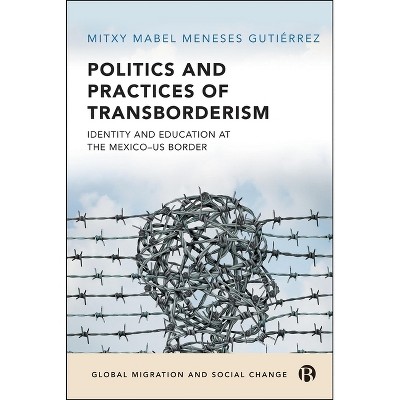The Digitalisation of Memory Practices in China - by Maximilian Mayer & Frederik Schmitz (Hardcover)

About this item
Highlights
- How is memory in China curated in the digital era?
- About the Author: Maximilian Mayer is Junior-Professor of International Relations and Global Politics of Technology at University of Bonn.
- 286 Pages
- Social Science,
Description
Book Synopsis
How is memory in China curated in the digital era?
This pioneering volume investigates the transformation of collective memory in China amid rapid technological change.
Introducing the concept of the "curating state," it reveals how digitalisation both supports and challenges official memories, giving rise to more hybrid and, at times, democratised memory practices. Bringing together leading Chinese and international scholars, the book examines the use of digital tools by state, private and commercial actors to curate their own versions of the past.
Combining theoretical innovation with rich empirical research, this is a vital resource for understanding the dynamic interplay between memory, media and power in contemporary China--and beyond.
Review Quotes
'In the digital age, memories are no longer forgotten but fragmented, contested or even artificially remade. Examining these pluriversal and contrapuntal dynamics, The Digitalisation of Memory Practices in China reveals the limits of the state's curatorial power. Its legitimacy, premised on multi-ethnic unity, is reworked by the very groups it designates, while its (colonial) modernity privileges images of democracy and welfare. This book unravels how memory governance both sustains and undermines state authority in surprising ways.' Shih Chih-Yu, Tongji University
'The Digitalisation of Memory Practices in China offers a powerful reconceptualisation of how collective memory is shaped, challenged and reimagined in an authoritarian context. At its core is the innovative notion of the 'curating state'--a framework that not only captures the selective and performative nature of state memory-making, but also exposes the ways in which digital technologies open up curatorial agency beyond official institutions. This volume demonstrates that memory in China is not monolithic but hybrid and contested, shaped through a dynamic interplay of censorship, commercialisation, digital infrastructures and grassroots interventions. With its impressive range of case studies and conceptual clarity, the book makes a landmark contribution not only to China studies, but to the broader fields of digital memory studies and global memory politics.' Silvana Mandolessi, KU Leuven
'Memory practices have been instrumental to the building of all modern nation-states, but they remain particularly sensitive for the state of a nation such as the People's Republic of China. Taking the encompassing curating power of the authoritarian party-state seriously while exploring the extant wriggle room of marginal non-state actors for leveraging information technologies to shape collective memories and heritage is a most daunting, but highly important task. Readers will find the scholarship assembled in this volume methodologically rich, conceptually innovative and in its scope truly Chinese global.' Ralph Weber, University of Basel
'In an era where digital technologies transform how societies remember and forget, this groundbreaking volume offers an incredibly valuable interdisciplinary analysis of how digitisation is reshaping memory and heritage practices in China, revealing a dynamic battleground where official narratives collide with grassroots remembrance, market forces and digital media infrastructures.
Conceptualizing the Chinese state as a 'curating state', the book explores how digitalisation both strengthens and disrupts its control over collective memory. On the one hand, the state has emerged as a powerful curator of the past--shaping narratives, controlling archives, and erasing inconvenient histories. On the other hand, as digital platforms multiply, so do the voices challenging and contesting the state's effort to curate memory. Activists, netizens and private archivists leverage digital tools to contest state-sanctioned histories, creating alternative archives and subversive memory practices.
Interdisciplinary in scope, The Digitalisation of Memory Practices in China bridges political science, media studies, memory research and cultural analysis. Engaging and timely, its chapters invite readers to rethink how power operates in the digital age--not just in China, but in many other societies where the struggle over memory is increasingly waged online. This is a must read for anyone interested in China studies, digital authoritarianism and memory politics.' Rongbin Han, University of Georgia
About the Author
Maximilian Mayer is Junior-Professor of International Relations and Global Politics of Technology at University of Bonn.
Frederik Schmitz is Research Fellow and PhD student at the University of Bonn.
Shipping details
Return details
Trending Book Pre-Orders











